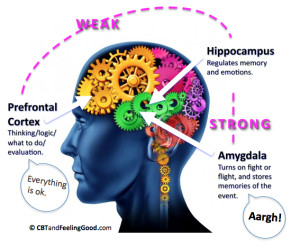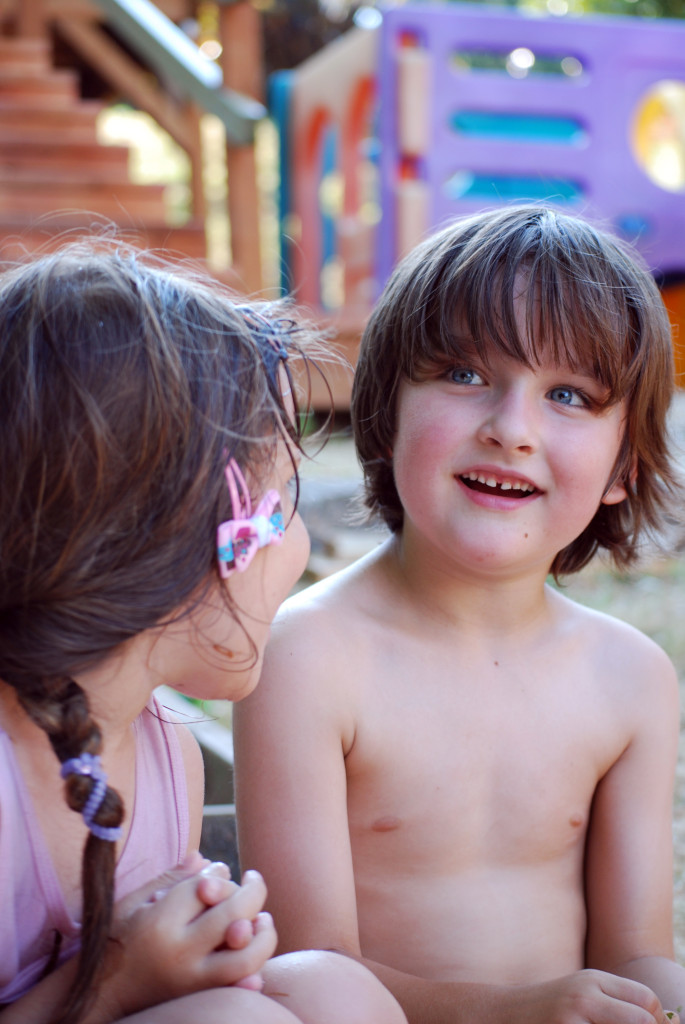“Your daughter should start a support group called Kindergarteners With Feelings.” It was 1991 and I was at my first parent-teacher conference for my now 29-year old child.
“It’s a hazard of being the child of a therapist,” I replied. We talked about feelings at our house. And about thoughts. And about the difference between the two. By the age of five, Maria knew that feelings didn’t have to make sense, and that usually they pass with time. She knew you did not have to do anything with a feeling, like act it out. But you could use words to share it with someone if that would help. It usually helped. She knew the difference between a feeling and a thought. I guess she shared a lot of feelings in kindergarten and apparently asked others to do the same. I took it as a compliment, even though I am not sure it was meant to be.
As science progresses, we continue to learn the importance of feeling states. We know unprocessed feelings get stuck in the body in all kinds of ways. The amygdala and the hippocampus, both set deep in the brain and considered the “p rimitive” part of the brain, are especially prone to trapping unprocessed feelings. So deep feelings, especially those involving fear and pain, stay stuck in the primitive brain and therefore give us three primitive signals: fight, flee, or freeze.
rimitive” part of the brain, are especially prone to trapping unprocessed feelings. So deep feelings, especially those involving fear and pain, stay stuck in the primitive brain and therefore give us three primitive signals: fight, flee, or freeze.
The problem is that we want our rational mind to understand our feelings and we wish that those messy feelings made sense. And so we say, to ourselves and others, “That (feeling) doesn’t make any sense.” We shut it down again, or ask another to shut it down, and it gets shoved right back into the amygdala where it continues to live primitively ever after. And now, you continue to either fight or flee or freeze. There is actually a fourth F, F#$% which is sometimes also used as a survival skill. Let me give you an example.
Let’s say your parents divorced when you were three. You didn’t understand what was happening, but you knew mommy and daddy weren’t in the same house anymore. You heard loud voices through the bedroom door sometimes and that made you scared. 
You remember daddy stumbling and falling sometimes. You knew mommy was sad and you started trying to help mommy. You helped by being very good and trying to not make her any sadder. You helped by being funny and charming and keeping a smile on her face. No one really talked to you about how you were doing, so you kept being really good when deep down (in the amygdala) you were really terrified and confused. Now it is forty years later and you are married with children. Your spouse has been really unhappy about things and keeps trying to talk with you and every time that happens you try to be funny. You don’t take the issues seriously. You are secretly terrified and confused but you don’t say that. You tell jokes and when that doesn’t work, you walk away. Sometimes you even try to initiate sex when your spouse is trying to talk to you about how things aren’t working well. If your partner has a glass of wine, you get really angry and make an accusation of too much drinking.
This is a common scenario. The old fears, the feelings, are driving behavior. They are dictating how you respond. They are saying, “See, it’s just like it was 37 years ago. It’s terrible. Quick. My world is going to fall apart!” But you don’t share this because it doesn’t seem rational. It seems stupid. Sharing it would make you ……(oh horrors) VULNERABLE.
Yup. When we share our feelings we become vulnerable and we allow others to really get to know us as unique individuals. That’s the good news. But for some it is the bad news.  Do I really have to talk about how I FEEL? Only if you really want to be known. Only if you really want to connect with another on a level other than the surface. Only if you want to communicate and know another person as an individual. Only if you want a good sex life.
Do I really have to talk about how I FEEL? Only if you really want to be known. Only if you really want to connect with another on a level other than the surface. Only if you want to communicate and know another person as an individual. Only if you want a good sex life.
When we share our feelings we become vulnerable and we allow others to really get to know us as unique individuals.
What? Wait? Talking about feelings helps in the bedroom? Yes, yes, yes. Couples who can share feelings comfortably and openly report a much more satisfying sex life. Sharing the hardest feelings to share— fear, sadness, and anger—open us up to a deeper connection with another. Apparently talking about how you feel, having transparency and being vulnerable, has the consequence of being an aphrodisiac in the bedroom. And remember, it doesn’t have to make rational sense that you feel a certain way. But speaking your feelings increases intimacy.
Sharing the hardest feelings to share— fear, sadness, and anger—open us up to a deeper connection with another.
If that isn’t enough incentive, talking about feelings increases your oxytocin and dopamine levels, those brain chemicals that increase our feelings of happiness and wellness. It is a natural anti-depressant to have a long, honest talk with a friend or a group of friends.
It is a natural anti-depressant to have a long, honest talk with a friend or a group of friends. Click To TweetThere is a surprising amount of good research in this field, some of which is in popular literature. You could read Brene’ Brown’s Daring Greatly, which is about how having the courage to be honest and vulnerable shatters our sense of shame and increases the sense of belonging and community. You could read Sue Johnson’s Hold Me Tight, which is a wonderful read about how getting to the emotions underneath problems is the cornerstone of good therapy, and therefore of good relationships.
If you are parenting you may be interested in a new book called Becoming Brilliant: What Science Tells Us About Raising Successful Children by Roberta Michnick Golinkoff and Kathy Hirsh-Pasek. One of the key factors in raising brilliant children is increasing a child’s capacity for empathy. Imagine that. If our children are allowed to feel and appropriately express their own feelings as well as listen to and feel other’s feelings they will be more brilliant. Hallelujah. I didn’t write the book, but I knew in my heart 30 years ago that raising an empathic child would be key to her development.
 Life is so Messy, you guys. The last two weeks have been ridiculously messy. And sharing feelings really helps. And it doesn’t make you weak or stupid or anything. It just makes you you. And that you that you really are, underneath all the stuff that you cover it up with, that you is precious. And unique. And has a story to tell that no one else can tell.
Life is so Messy, you guys. The last two weeks have been ridiculously messy. And sharing feelings really helps. And it doesn’t make you weak or stupid or anything. It just makes you you. And that you that you really are, underneath all the stuff that you cover it up with, that you is precious. And unique. And has a story to tell that no one else can tell.
So share your feelings, all the messiness of them, and experience a more marvelous life.
Amy


EXCELLENT ARTICAL ,AMY!!
THANKS FOR SHARING, DEFINATELY GREAT BOOKS YOU MENTION!
Love this,as always!
Mimi
Just discovered this blog really enjoying it!
Thanks, Kelly! There will be a new one up every Monday. We appreciate your readership and hope you will share it if you like it. You can also find us on FB at LiM2!!!